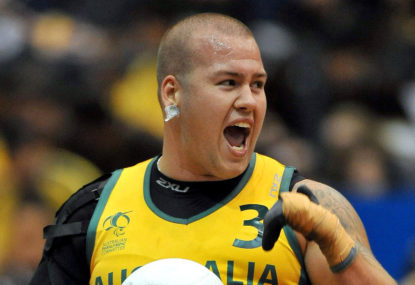'An iconic roster': LeBron, Steph, KD headline all-star cast for Team USA's shot at Olympic glory
LeBron James is going back to the Olympics for the first time in 12 years. Steph Curry is headed to the games for the…

The Australian Paralympic Team has finished the Rio Paralympics in fifth place on the medal table with 81 medals; 22 gold, 30 silver 29 bronze. The Games was a fantastic showcase of the sporting abilities of Paralympians.
Australia met its Winning Edge goal of finishing in the top five on the medal table but this target is becoming increasingly difficult with many countries now investing in and committing to Paralympic sport.
Medal Summary
Archery – 1 Bronze (first medal since 1984)
Athletics – 3 Gold, 9 Silver, 15 Bronze; 27 total
Cycling – 3 Gold, 7 Silver, 2 Bronze; 12 total
Rowing – 1 Silver
Paracanoe – 1 Gold, 1 Silver, 1 Bronze; 3 total
Sailing – 2 Gold, 1 Silver; 3 total
Swimming – 9 Gold, 10 Silver, 10 Bronze; 29 total
Table tennis – 1 Silver (first medal since 1984)
Triathlon – 1 Gold
Wheelchair rugby – 1 Gold
Wheelchair tennis – 2 Gold (first gold since 2000)
Australian won 22 gold, 30 silver 29 bronze fora total of 81 medals, slightly down from London’s 2012 haul of 32 gold, 23 silver and 30 bronze (85 medals). The total medal result was close to London but the number of gold was down. This was due to two Australian swimmers dominating in London – Jacquie Freney with eight gold and Matthew Cowdrey with five gold.
Australia’s performance on the medal tally is dictated largely by results in swimming, athletics and cycling as these sports provide the bulk of medals on offer.
So how did Australia go in the 16 sports that we participated in this time around?
Jonathon Milne won Australia’s first archery medal since 1984 by winning bronze in the men’s individual compound W1.
The three golds in athletics came from Scott Reardon in the men’s 100m T42, Brayden Davidson in the men’s long jump T36 and James Turner in the men’s 800m T36. Turner’s performance was very impressive as he annihilated the field with a world record. 15-year-old Isis Holt highlighted her future potential by winning two individual silvers and one bronze medal.
Kurt Fearnley won a silver and bronze in his final Games and finished his Paralympic career with a total of 13 medals, including three gold.
The three golds in cycling came from Carol Cooke (2) on the road and David Nicholas in the men’s individual pursuit. Kieran Modra’s bronze in the vision-impaired tandem road time trial time gave him his tenth medal, including five golds, dating back to 1992. Alistair Donohoe was very unlucky not to win gold in the men’s race after a crash caused by another rider on the finish line.
Paracanoe’s debut resulted in a medal of each colour with Afghanistan war veteran Curtis McGrath winning gold in the men’s KL2 200m.
Rowing repeated its London result with Erik Horrie winning silver again in the men’s single scull.
Triathlon’s debut resulted in a gold medal to Katie Kelly and her guide Michellie Jones, who had previously won Australia’s first Olympic triathlon medal with silver at the Sydney Paralympics. Multiple world champion Bill Chaffey just missed the podium by finishing fourth.
Sailing had a very successful Games, surpassing the good performance at the Olympics. Daniel Fitzgibbon and Liesl Tesch retained the gold won in London, the sonar team of Russell Boarden, Colin Harrison and Jonathan Harris won gold and Matt Bugg in the 2.4mR won silver despite disqualification in the penultimate race.
Swimming’s nine gold medals included seven individual golds. Madison Elliott was the only multiple individual gold medallist with two. The women’s team emulated their Olympic counterparts by winning the 100m freestyle relay in world record time. Ellie Cole (two gold) and Lakeisha Patterson (two gold) left Rio with six medals.
Samuel von Einem won Australia’s first medal in table tennis since 1984 by taking home silver in the men’s singles class 11.
Dylan Alcott dominated the quad wheelchair tennis winning gold in the singles and teaming with Heath Davidson to win the doubles. Alcott previously had won gold and silver in wheelchair basketball.
The Rollers wheelchair basketball team had a disappointing tournament, finishing sixth despite going into the Games as the world champions.
The Steelers wheelchair rugby team retained the gold medal won in London by defeating the United States 59-58 in double overtime.
Since Sydney 2000, when Australia was the number one nation at the Paralympics, Australia has constantly finished fifth on the medal table. The team was a little fortunate to do so in Rio with the banning of the Russian team.
It will be difficult for Australia to maintain a top-five position going forward. Since Sydney, China has dominated the Paralympics in all the individual sports, Great Britain has nearly always been ranked in the top two or three nations and has recently strengthened due to more funding.
The United States operates its program through the United States Olympic Committee and now has a program for military personnel. Ukraine’s highly successful swimming program has it on the path to becoming a top-five nation and Russia has also made a strong investment in Paralympic sport.
Australia performs remarkably well when you think about its population size. This disadvantage has been somewhat nullified through the team’s successful talent search program and by assisting athletes to change sports. Amanda Reid, Liesl Tesch, Dylan Alcott and James Turner have all changed sports in recent years and won medals in Rio.